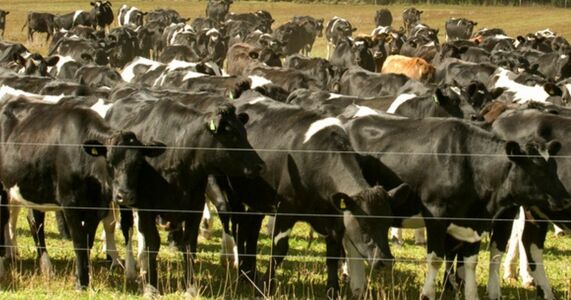100 signatures reached
To: Environment Southland
Phase out synthetic nitrogen fertiliser - Southland

We call on the Southland Regional Council to use its environmental mandate to phase out synthetic nitrogenous fertiliser using the policy instruments available.
Why is this important?
Synthetic nitrogenous fertiliser should be banned because:
🌏 It pollutes our rivers and lakes
🌏 It is responsible for the growth of intensive, unsustainable farming
🌏 It causes the release of nitrous oxide, one of the worst greenhouse gases
🌏 It is a likely cause of bowel cancer
🌏 It is degrading the natural health of our soils
Everyone deserves safe drinking water and clean rivers to swim in.
But too many cows, and too much chemical fertiliser, are rapidly polluting the rivers, lakes and drinking water we should all be able to enjoy and rely on. The agriculture sector is currently Aotearoa New Zealand’s biggest polluter, causing 48% of all our greenhouse gas emissions, and overloading our rivers with synthetic nitrogen in the form of nitrates (nitrogen).
Southland’s cow numbers have increased by 16 times since 1990, from 38,000 to 636,000 and according to Stats NZ we have nationally increased the tonnes of nitrogen fertiliser applied to farmland per annum by 629 per cent from 1991 to now (from 62,000 tonnes to 452,000 tonnes).
Our once clean rivers and lakes are increasingly polluted.
Our once-safe drinking water is being contaminated. A 2019 report found nitrate was the contaminant with the highest risk ranking in Southland’s groundwater. Growing research is showing a strong link between nitrate in drinking water and babies being born underweight or prematurely.(1,2)
Chronic exposure is associated with formation of carcinogenic nitroso compounds in the gastrointestinal tract. Chronic exposure through drinking water containing > 0.88 mg/L (as nitrate-N) has recently been linked to colorectal cancers. (1,2)
It’s shocking that Southland has to build a Charity Hospital to deal with the large number of colonoscopies needed by people from across Murihiku Southland which the current Southland Hospital does not have the capacity to deal with.
Synthetic nitrogenous fertiliser is mostly sold here by just two companies; Ravensdown and Ballance have industrial dairying as their biggest customer by far.
A transition away from industrial livestock farming and mass milk production is required. It starts with an urgent ban on synthetic nitrogenous fertiliser, and a nationwide shift to more plant-based regenerative organic farming.
Our Regional Council has the responsibility for environmental management, monitoring, enforcement and compliance, and has the power to end synthetic nitrogenous fertiliser use.
Join the call! Add your name today to demand our Councillors cut synthetic nitrogenous fertiliser.
Also you can request free nitrate testing for private bores if you wish to have peace of mind that your own water supply is safe: https://petition.act.greenpeace.org.nz/agriculture-nitrate-testing-request
References
1 - Link between nitrate levels and premature births, study finds, 2021 https://bit.ly/3vacKKK
2 - Human health risks associated with contaminants in Southland waters, 2019 https://bit.ly/3sjB5f2
3 - Report: The hidden killer, 2019. How synthetic nitrogen fertiliser is fuelling intensive dairying,
polluting our rivers and climate. https://www.greenpeace.org/static/planet4-aotearoa-stateless/2019/09/8130950a-greenpeace-synthetic-nitrogen-fertiliser-briefing.pdf
🌏 It pollutes our rivers and lakes
🌏 It is responsible for the growth of intensive, unsustainable farming
🌏 It causes the release of nitrous oxide, one of the worst greenhouse gases
🌏 It is a likely cause of bowel cancer
🌏 It is degrading the natural health of our soils
Everyone deserves safe drinking water and clean rivers to swim in.
But too many cows, and too much chemical fertiliser, are rapidly polluting the rivers, lakes and drinking water we should all be able to enjoy and rely on. The agriculture sector is currently Aotearoa New Zealand’s biggest polluter, causing 48% of all our greenhouse gas emissions, and overloading our rivers with synthetic nitrogen in the form of nitrates (nitrogen).
Southland’s cow numbers have increased by 16 times since 1990, from 38,000 to 636,000 and according to Stats NZ we have nationally increased the tonnes of nitrogen fertiliser applied to farmland per annum by 629 per cent from 1991 to now (from 62,000 tonnes to 452,000 tonnes).
Our once clean rivers and lakes are increasingly polluted.
Our once-safe drinking water is being contaminated. A 2019 report found nitrate was the contaminant with the highest risk ranking in Southland’s groundwater. Growing research is showing a strong link between nitrate in drinking water and babies being born underweight or prematurely.(1,2)
Chronic exposure is associated with formation of carcinogenic nitroso compounds in the gastrointestinal tract. Chronic exposure through drinking water containing > 0.88 mg/L (as nitrate-N) has recently been linked to colorectal cancers. (1,2)
It’s shocking that Southland has to build a Charity Hospital to deal with the large number of colonoscopies needed by people from across Murihiku Southland which the current Southland Hospital does not have the capacity to deal with.
Synthetic nitrogenous fertiliser is mostly sold here by just two companies; Ravensdown and Ballance have industrial dairying as their biggest customer by far.
A transition away from industrial livestock farming and mass milk production is required. It starts with an urgent ban on synthetic nitrogenous fertiliser, and a nationwide shift to more plant-based regenerative organic farming.
Our Regional Council has the responsibility for environmental management, monitoring, enforcement and compliance, and has the power to end synthetic nitrogenous fertiliser use.
Join the call! Add your name today to demand our Councillors cut synthetic nitrogenous fertiliser.
Also you can request free nitrate testing for private bores if you wish to have peace of mind that your own water supply is safe: https://petition.act.greenpeace.org.nz/agriculture-nitrate-testing-request
References
1 - Link between nitrate levels and premature births, study finds, 2021 https://bit.ly/3vacKKK
2 - Human health risks associated with contaminants in Southland waters, 2019 https://bit.ly/3sjB5f2
3 - Report: The hidden killer, 2019. How synthetic nitrogen fertiliser is fuelling intensive dairying,
polluting our rivers and climate. https://www.greenpeace.org/static/planet4-aotearoa-stateless/2019/09/8130950a-greenpeace-synthetic-nitrogen-fertiliser-briefing.pdf
How it will be delivered
In person to Councillors
